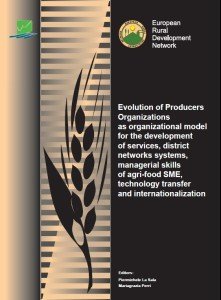European Rural Development Network
Conference proceedings series:
Evolution of Producers Organizations as organizational model for the development of services, district networks systems, managerial skills of agri-food SME, technology transfer and internationalization
Edited by: Piermichele La Sala and Mariagrazia Perri
(…) The issues related to producers’ organisations have come to the fore of European policy debates as a result of the internationalisation and globalisation of agri-food markets. Cooperation of agricultural producers enables them to achieve many benefits connected with the building of the competitive advantages by increasing the concentration and specialization of agricultural production, as well as facilitating the adjustment to the effective demand on the market. Horizontal integration processes cause the long-term effects that are not only the rationalization of the production process of agricultural products, but also it can have a positive impact on the extent of vertical integration in the primary wholesale area. In this context, the agricultural producer organisations are a tool to stabilize the situation in the agricultural sector and form the basis of well-functioning agricultural markets. (…) This book is a result of cooperation of the participants of the EuroMed 8th Annual Conference “Innovation, Entrepreneurship and Sustainable Value Chain in a Dynamic Environment”, hosted by University of Verona, Italy, September 16-18, 2015, and the European Rural Development Network (ERDN) (…).
Paweł Chmielinski, ERDN (Foreword, p.5)
(…) Producers Organisations (PO) are, to date, one of the main tools that sectoral policies identified to increase the competitive advantage of farms. The theme of the aggregation of producers, whether territorial or functional, plays a decisive role in the scientific debate, political and technical support for the development of modern agriculture.
(…) the demand for agricultural products at the farm, exercised by wholesalers, the processing industry, from the collection centres, has forced farms to specialize in a few products that meet the requirements of these new sales figures. It is at this point that begins to be felt the problem of fragmentation of supply. Farmers, in fact, are often at a disadvantage in negotiations with wholesalers and processing industries and most of them do not manage to adapt their production to the new business needs. The change in the way and the place of purchase have concentrated much demand for food products for the benefit of modern distribution outlining a new set of trade where the demand for food and agricultural products is carried mainly by two figures: the processing industries and the organised distribution. This concentration of demand has increasingly emphasized the need to increase the size of the offering, through the reorganization of larger dimensions than the current ones, to meet the new characteristics of the demand and not to lose bargaining power. (…)
Piermichele La Sala and Mariagrazia Perri (Preface. The role of the producers organizations in the local
development, pp. 7-15)
Series: Conference proceedings
Title: Evolution of Producers Organizations as organizational model for the development of services, district networks systems, managerial skills of agri-food SME, technology transfer and internationalization
Editors: Piermichele La Sala, Mariagrazia Perri
Year: 2015
Place of issue: Warsaw-Foggia
ISBN: 978-83-7658-598-7
Download:
Hard copy upon request: erdn@ierigz.waw.pl (full version).
More about the Conference on IAFE_NRI site… and http://emrbi.org/

